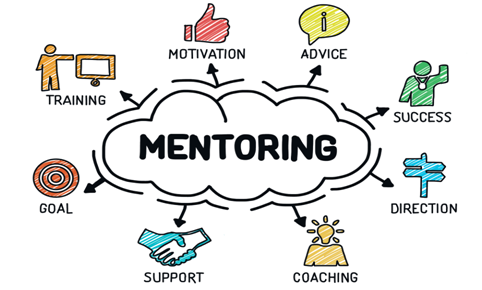
Mentors nurture careers and recharge their institutions
For many organizations, mentorships are an afterthought — pairings of veteran colleagues with new hires for casual chats over coffee that, predictably, yield scant results. Not long ago, mentorship was about “building more of a friendship than a relationship with goals resulting in new skills,” says Wendy Axelrod, an executive coach and member of the Rotary Club of Blue Bell, Pennsylvania.
One common mistake is thinking of professional mentorships as similar to a surrogate parenting relationship. “Unlike mentoring for youth, which is often driven by the mentor, an adult mentorship needs to be driven by the learner, the mentee,” says Lisa Fain, CEO of the Center for Mentoring Excellence. “Someone new to their career wants to set a vision. What are the possibilities in my field, or in my work with Rotary? How do I become a person of influence in my community?”
When mentorships work, both partners reap the rewards. “The data shows over and over that the mentor gets as much out of it as their mentee,” says Fain. “They become better leaders, they become better professionals. And they get the satisfaction of hooking their wagon to a rising star.”
FOR CLUBS CREATING MENTORSHIPS
DO's
Do survey participants beforehand. “It is good to have a questionnaire that asks what people are looking for in a mentor,” says RI Director Elizabeth Usovicz of the Rotary Club of Kansas City-Plaza, Missouri. “What kind of career accomplishments do you think you can learn from? Is this someone whose behavior you admire?”
Do demand effort. “There has to be a real motivation to have a mentoring relationship,” says Usovicz. “Look for someone who has talent or who seems to have plateaued a bit but has the potential to really move forward in their career.”
Do look for complements when establishing a mentoring pair. “I would be cautious about matching like with like, such as people with the same personality type,” says Fain. “By matching across differences there can be a lot of learning and new perspectives.”
FOR MENTORS
DO's
Do keep a regular schedule: Aim for an hour once a month. Longer lapses between conversations make it harder to pick up the thread of the previous one. Mentorships should last no more than a year, and no less than six months.
Do ask mentees open-ended questions. “Really listen and clarify the questions instead of just giving an easy answer,” suggests Usovicz.
Do put mentees to the test. Encourage them to undertake what Axelrod calls “pilot tests,” such as offering to lead a high-level team meeting. Then hold a debriefing to ask how the initiative went.
DONT's
Don’t break confidences. “If something a mentee has said gets disclosed to the boss, it can be careerdamaging,” warns Usovicz. Likewise, mentees also need to keep the conversations private. This allows for candor.
MAKE A MENTORING CONTRACT
- Detail the objectives of the mentorship in a straightforward manner. Stick with two or three priorities.
- Determine the frequency of meetings. Set the day, time, and location. And establish how long the mentorship will last.
- Include a clause that says conversations will remain confidential.
FOR MENTEES
DO's
Do explain what you want to learn — and be specific about the commitment. “Say, ‘I’d love to meet with you monthly and pick your brain on this specific area of expertise for the next six months,’” says Jenn Labin of MentorcliQ, a company that offers software that allows companies to automate their mentoring programs.
Do accept feedback, including constructive criticism, with grace.
Do expect to have many mentors during your career. “One of the myths that I like to break down is that there’s a Yoda out there for all of us, one mentor to solve all of our problems. That’s not how it works,” says Labin. “You can, and should, have several mentors.”
DONT's
Don’t allow meetings to devolve into gripe sessions. Plan a clear agenda of items to discuss, says Fain. Some social chitchat is fine, but know when to focus on goals and tasks.
RESOURCES
- Rotary.org/learn: The Rotary Learning Center course Mentoring Basics explains the responsibilities and benefits of being a mentor to an adult professional.
- Washington.edu: Usovicz is a big fan of the mentoring toolkit (in PDF form) offered by the University of Washington Department of Human Resources.